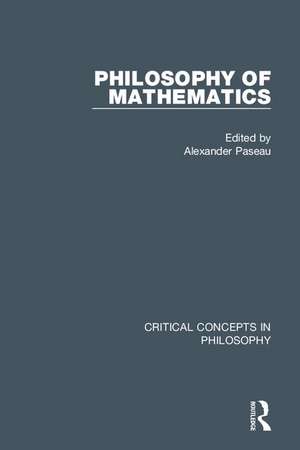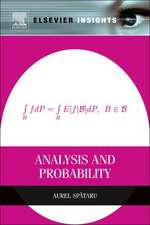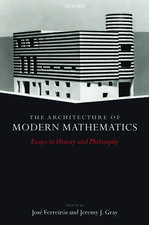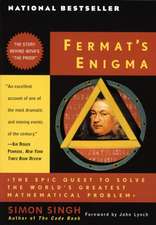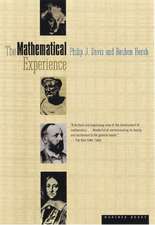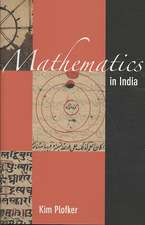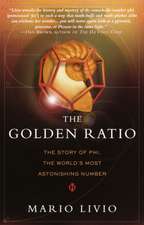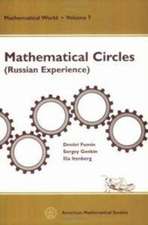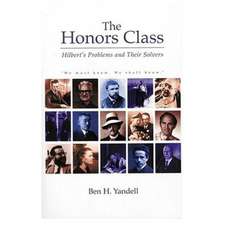Philosophy of Mathematics: Critical Concepts in Philosophy
Editat de A. Paseauen Limba Engleză Hardback – 24 feb 2017
The philosophy of mathematics is also one of the oldest academic fields, more or less coeval with philosophy itself. But contemporary philosophy of mathematics is rather different from its pre-twentieth-century antecedents, largely for three reasons. The first is that since the seventeenth century, mathematics has become integral to science. Science has over the past few centuries become increasingly mathematical, and indeed the fundamental science of nature, physics, is today recognised as a branch of applied mathematics. The second is that mathematics underwent a transformation in the course of nineteenth century: having started the century as a rather traditional-looking science of quantity it emerged a hundred years later a radically transformed abstract theory of structure. The final factor in the transformation of the philosophy of mathematics is the rise of modern logic. Developed by Frege, Cantor and others in the late nineteenth century, modern logic pervades contemporary mathematics, philosophy and computer science, and has had an immeasurable effect on the philosophy of mathematics.
These volumes will collect the major works in this major field, with a focus on the last few decades. The anthology will include technical work, which interprets philosophically significant mathematical results or subfields of mathematics, as well as purely philosophical writing, aimed at those without advanced mathematics. The collection should be of interest to both philosophers and mathematicians, as well as to anyone who is susceptible to wondering what the main intellectual tool used in science, economics and finance, and indeed everyday life is ultimately about.
Din seria Critical Concepts in Philosophy
- 34%
 Preț: 6173.50 lei
Preț: 6173.50 lei - 34%
 Preț: 6769.83 lei
Preț: 6769.83 lei - 34%
 Preț: 5934.30 lei
Preț: 5934.30 lei - 36%
 Preț: 4367.10 lei
Preț: 4367.10 lei - 34%
 Preț: 4367.51 lei
Preț: 4367.51 lei - 34%
 Preț: 4516.00 lei
Preț: 4516.00 lei - 36%
 Preț: 5488.46 lei
Preț: 5488.46 lei - 33%
 Preț: 1619.58 lei
Preț: 1619.58 lei - 34%
 Preț: 6179.08 lei
Preț: 6179.08 lei - 34%
 Preț: 6733.87 lei
Preț: 6733.87 lei - 34%
 Preț: 6136.37 lei
Preț: 6136.37 lei - 34%
 Preț: 6176.35 lei
Preț: 6176.35 lei - 34%
 Preț: 3815.28 lei
Preț: 3815.28 lei - 34%
 Preț: 5914.73 lei
Preț: 5914.73 lei - 34%
 Preț: 6181.26 lei
Preț: 6181.26 lei - 34%
 Preț: 5487.39 lei
Preț: 5487.39 lei - 34%
 Preț: 6182.46 lei
Preț: 6182.46 lei - 34%
 Preț: 6183.28 lei
Preț: 6183.28 lei - 34%
 Preț: 6181.65 lei
Preț: 6181.65 lei - 34%
 Preț: 7302.41 lei
Preț: 7302.41 lei - 34%
 Preț: 7295.48 lei
Preț: 7295.48 lei - 34%
 Preț: 6741.63 lei
Preț: 6741.63 lei - 34%
 Preț: 5630.07 lei
Preț: 5630.07 lei
Preț: 4380.97 lei
Preț vechi: 6612.31 lei
-34% Nou
Puncte Express: 6571
Preț estimativ în valută:
838.56€ • 911.17$ • 704.85£
838.56€ • 911.17$ • 704.85£
Carte tipărită la comandă
Livrare economică 21 aprilie-05 mai
Preluare comenzi: 021 569.72.76
Specificații
ISBN-13: 9781138886667
ISBN-10: 1138886661
Pagini: 1809
Ilustrații: 7
Dimensiuni: 156 x 234 x 135 mm
Greutate: 3.45 kg
Ediția:1
Editura: Taylor & Francis
Colecția Routledge
Seria Critical Concepts in Philosophy
Locul publicării:Oxford, United Kingdom
ISBN-10: 1138886661
Pagini: 1809
Ilustrații: 7
Dimensiuni: 156 x 234 x 135 mm
Greutate: 3.45 kg
Ediția:1
Editura: Taylor & Francis
Colecția Routledge
Seria Critical Concepts in Philosophy
Locul publicării:Oxford, United Kingdom
Cuprins
Volume I: Historical Readings in the Philosophy of Mathematics
1. Plato (early 4th century BC). From E. Hamilton & H. Cairns (eds. 1963 corrected reprint., Bollingen Foundation):Meno 80b-86b, W.K.C. Guthrie (trans.), pages 363-371
2. Plato (early 4th century BC). From B. Jowett (ed.), The Dialogues of Plato (1953), Oxford University Press: Phaedo 72e-77d, B. Jowett (trans.), pages 425-431
3. Plato (early 4th century BC). From John Cooper (ed.), Plato: Complete Works (1997), (trans.) G.M.A. Grube & C.D.C. Reeve, Hackett: Republic Book 6, 507a-511e, pages 1126-1133.
4. Plato (early 4th century BC). From John Cooper (ed.), Plato: Complete Works (1997), (trans.) G.M.A. Grube & C.D.C. Reeve, Hackett: Republic Book 7, 525a-527c, pages 1140-1145.
5. Aristotle (mid-4th century BC). From Jonathan Barnes (ed.), The Complete Works of Aristotle (1984), Princeton University Press:Metaphysics Book B, part ii, pages 1574-1575.
6. Aristotle (mid-4th century BC). From Jonathan Barnes (ed.), The Complete Works of Aristotle (1984), Princeton University Press:Metaphysics Book E, part I, page 1619.
7. Aristotle (mid-4th century BC). From Jonathan Barnes (ed.), The Complete Works of Aristotle (1984), Princeton University Press:Metaphysics Book Z, part x-xi, pages 1633-1637.
8. Aristotle (mid-4th century BC). From Jonathan Barnes (ed.), The Complete Works of Aristotle (1984), Princeton University Press:Metaphysics Book Th , part ix, page 1660.
9. Aristotle (mid-4th century BC). From Jonathan Barnes (ed.), The Complete Works of Aristotle (1984), Princeton University Press:Metaphysics Book I, parts i-ii, pages 1662-1665.
10. Aristotle (mid-4th century BC). From Jonathan Barnes (ed.), The Complete Works of Aristotle (1984), Princeton University Press:Metaphysics Book K, parts ii-iv and vii, pages 1675-1677 and 1680-1681.
11. Aristotle (mid-4th century BC). From Jonathan Barnes (ed.), The Complete Works of Aristotle (1984), Princeton University Press:Metaphysics Book M, parts i-iii, pages 1701-1705
12. Aristotle (mid-4th century BC). From Jonathan Barnes (ed.), The Complete Works of Aristotle (1984), (trans.) R.P. Hardie and R.K. Gaye, Princeton University Press.Physics, Book B, part ii, pages 330-332.
13. Aristotle (mid-4th century BC). From Jonathan Barnes (ed.), The Complete Works of Aristotle (1984), Princeton University Press:Physics, Book C, parts vi-viii-8, pages 351-354.
14. Aristotle (mid-4th century BC). From Jonathan Barnes (ed.), The Complete Works of Aristotle (1984), (trans.) J.A. Smith, Princeton University Press: De Anima (On the Soul), Book C, parts vi-viii, pages 684-687.
15. René Descartes (1637) Part 2 of Discourse on Method, J. Cottingham, R. Stoothoff and D. Murdoch (trans. & eds.) Descartes: Selected Philosophical Writings, pages 25-31.
16. John Locke (1689), from An Essay Concerning Human Understanding, R.S. Woolhouse (ed.) (1997), Penguin: Book I, Chapter II, pages 59-75.
17. John Locke (1689), from An Essay Concerning Human Understanding, R.S. Woolhouse (ed.) (1997), Penguin: Book IV, Chapter II, pages 471-479.
18. George Berkeley (1710), Treatise Concerning the Principles of Human Knowledge, 118-134, pages 131-139, D. M. Clarke (ed) (2008), Cambridge University Press.
19. Gottfried Leibniz (1716), from R.S. Woolhouse and R. Francks (trans. and eds.) G.W. Leibniz: Philosophical Texts (1998), Oxford University Press. Sections 23 to 25 of Reply to Bayle's Note L, pages 252-253.
20. Gottfried Leibniz (1714), from R.S. Woolhouse and R. Francks (trans. and eds.) G.W. Leibniz: Philosophical Texts (1998), Oxford University Press. Sections 28 to 38 of Monadology, pages 271-273.
21. Gottfried Leibniz (1685), from P. Wiener (ed.) Leibniz: Selections (1951), Charles Scribner’s Sons. "The Art of Discovery" pages 50-58.
22. D’Alembert, J. L. (1751), Preliminary Discourse to the Encyclopedia of Diderot (1995), R.N.Schwab (transl), University of Chicago Press, pages 16-29.
23. Immanuel Kant (1787), from N. Kemp Smith (transl. and ed.) Critique of Pure Reason (B) (1929), Macmillan. Introduction and Transcendental Aesthetic, B1-73, pages 41-91.
24. Immanuel Kant (1783), from P. Carus & J. W. Ellington Prolegomena to any future metaphysics that will be able to come forward as science (1977), Hackett. Sections 6-13 (inc. Remarks I and II), pages 25-33.
25. John Stuart Mill (1843), from A System of Logic, volume 7 of Collected Works of John Stuart Mill, J.M. Robson (ed.) (1973), University of Toronto Press: Book II, Chapter VI, pages 252-261.
26. John Stuart Mill (1843), from A System of Logic, volume 7 of Collected Works of John Stuart Mill, J.M. Robson (ed.) (1973), University of Toronto Press: Book III, Chapter XXIV, pages 604-621.
27. Richard Dedekind (1888), "On the nature and meaning of numbers" in Essays on the Theory of Numbers (1963), pages 31-115, transl. by W.W. Beman, Dover.
28. Albert Einstein (1921), "Geometrie und Erfahrung", transl. by S. Bargmann as "Geometry and Experience" and repr. in his Ideas and Opinions (1954), Condor, pp. 232-46.
Volume II Early 20th Century Philosophies: Logicism, Logical Empiricism,
Intuitionism and Formalism
Logicism and its critics
29. Gottlob Frege (1884), Foundations of Arithmetic, transl. by J. Austin (Blackwell, 1950),
sections 55-109, pages 67e-119e.
30. Gottlob Frege (1893), from The Basic Laws of Arithmetic, transl. and ed. by P. A. Ebert &
M. Rossberg with C. Wright, Oxford University Press. Introduction and Part I (sections 1 to
52), pp. 1-69 and Appendices to Volume I, pp. 239-251.
31. Bertrand Russell’s letter to Frege and Frege’s reply to Russell, transl. by B. Woodward,
in J. van Heijenoort (ed.), From Frege to Gödel, a source book in Mathematical Logic 1879
-1931, Harvard UP, pp 124-128.
32. Alfred North Whitehead & Bertrand Russell, B. (1910-13), Introduction to the 2nd ed. and
Introduction, Principia Mathematica, pp. xii-xlvi and 1-84 of Principia Mathematica to *56
(1997), Cambridge University Press.
33. Henri Poincaré (1906), "Mathematics and Logic III" transl. by G.B. Halsted & W. Ewald
and repr. in Ewald (1996), pp. 1052-1071.
34. Bertrand Russell (1919), Introduction to Mathematical Philosophy , Spokesman,
Chapters 1 (pp.1-10), 2 (pp.11-19), 3 (pp.20-28), 12 (pp.117-130), 13 (pp.131-143), and 18 (pp.194-206).
35. Crispin Wright (1997), "On the Philosophical Significance of Frege’s Theorem", in
R.G. Heck (ed.), Language, Thought and Logic: Essays in Honour of Michael Dummett. Pages 201-244.
36. George Boolos (1997), "Is Hume’s Principle Analytic?", in R.G. Heck (ed.), Language,
Thought and Logic: Essays in Honour of Michael Dummett. Pages 245-261.
Intuitionism
37. L.E.J. Brouwer, "On the significance of the principle of excluded middle in mathematics,
especially in function theory" incl. Addenda & Corrigenda, transl. by S. Bauer-Mengelberg,
repr. in van Heijenoort (1967), pp. 335-45.
38. Arend Heyting, (1931), "The intuitionist foundations of mathematics" (1931), transl. by
E. Putnam & G.J. Massey and repr. in P. Benacerraf & H. Putnam (eds), Philosophy of
Mathematics: selected readings 1983, Cambridge University Press, pp 52-61.
39. Arend Heyting (1956), "Disputation", in P. Benacerraf & H. Putnam (eds), Philosophy of
Mathematics: selected readings 1983, Cambridge University Press, pp. 66-76.
40. Michael Dummett (1973), "The philosophical basis of intuitionistic logic",
in his Truth and Other Enigmas (Duckworth, 1978), pages 215-47.
Formalism
41. David Hilbert (1925), "On the infinite", trans. by S. Bauer-Mengelberg, in
van Heijenoort (1967), pp. 367-392.
42. William Tait (1981), "Finitism", Journal of Philosophy 77, pp. 524-46.
Logical Empiricism
43. A.J. Ayer (1936), Chapter IV of Language, Truth and Logic, Penguin, pages 64-83
44. Moritz Schlick (1925), §7 (pp.31-39) and §38 (pp.348-358) of General Theory of
Knowledge (1974), transl. by A. E. Blumberg, Springer-Verlag.
45. Rudolf Carnap (1950), "Empiricism, Semantics and Ontology",
repr. in Benacerraf & Putnam (1983), pp. 241-257.
Volume III Contemporary Foundations, Set Theory and Structuralism
46. Ernst Zermelo (1908), "Investigations in the Foundations of Set Theory I" trans. by S.
Bauer-Mengelberg as and repr. in J. van Heijenoort (ed.) (1967), From Frege to Gödel,
Harvard University Press, pp. 199-215.
47. Willard V. Quine (1960), Chapter 7 of Word and Object (pages 233-76), MIT Press.
48. Paul Benacerraf (1965), "What Numbers Could Not Be", Philosophical Review 74, pp. 47-73.
49. Paul Benacerraf (1973), "Mathematical Truth", The Journal of Philosophy 70, pp. 661-679.
50. Penelope Maddy (1990), Chapter 2 of Realism in Mathematics, pages 36-80, Oxford
University Press.
51. Hilary Putnam (1967), "Mathematics without Foundations", The Journal of Philosophy 64, pp. 5-22.
52. Geoffrey Hellman (1989), Introduction and Chapter 1 (pp. 1-52) of Mathematics without Numbers,
Oxford University Press.
53. Charles Parsons (1990), "The Structuralist View of Mathematical Objects", Synthese 84, pp. 303-46.
54. David Lewis (1993), "Mathematics is Megethology", in his Philosophical Papers (1998),
Cambridge University Press, pp. 203-229.
55. Geoffrey Hellman (2001), "Three Varieties of Mathematical Structuralism",
Philosophia Mathematica 9, pp. 184-211.
56. Alex Oliver & Timothy Smiley (2006), "What are sets and what are they for?",
Philosophical Perspectives 20, pp. 123-55.
57. Øystein Linnebo and Richard Pettigrew (2011), "Category Theory as an Autonomous Foundation",
Philosophia Mathematica 19, pp. 227–54.
Volume IV: Proof and Mathematical Justification
58. Kurt Gödel (1931), "On formally undecidable propositions of Principia mathematica and
related systems I", , transl. by J. van Heijenoort and repr. in vol. I of his Collected Works,
S. Feferman et al. (eds), Oxford University Press (1990), pp. 144-195.
59. Kurt Gödel (1964), "What is Cantor’s Continuum Problem?", repr. in vol. II of his
Collected Works, pp. 254-270.
60. George Boolos (1971), "The Iterative Conception of Set", Journal of Philosophy 68, pp. 215-231.
61. Imre Lakatos (1976), "A renaissance of empiricism in the recent philosophy of mathematics",
The British Journal for the Philosophy of Science 27, pp. 201-223.
62. Daniel Isaacson (1987) "Arithmetical Truth and Hidden Higher-Order Concepts",
in W.D. Hart (ed.), The Philosophy of Mathematics, Oxford University Press (1996), pp. 203-224.
63. Penelope Maddy (1988), "Believing the Axioms I", Journal of Symbolic Logic 53, pp. 481-511.
64. Penelope Maddy (1993), "Does V = L?", Journal of Symbolic Logic 58, pp. 15-41
65. Don Fallis (1997), "The Epistemic Status of Probabilistic Proof", Journal of Philosophy 94,
pp. 165-186.
66. Mic Detlefsen (2008), "Purity as an Ideal of Proof", in P. Mancosu (ed.),
The Philosophy of Mathematical Practice, Oxford University Press, pp. 179-197.
67. Peter Smith (2013), Chapters 44 and 45 (pages 338-66) of An Introduction to Gödel’s
Incompleteness Theorems (2nd ed.), Cambridge University Press.
68. A.C. Paseau (2015) "Mathematical Knowledge without Proof", The British Journal for the
Philosophy of Science, pp.1-25.
Volume V: The Indispensability Argument
69. Willard V. Quine (1951), "Two Dogmas of Empiricism" in his From A Logical Point of
View, pages 20-46.
70. Willard V. Quine & Nelson Goodman (1947), "Steps Towards a Constructive Nominalism",
Journal of Symbolic Logic 12, pp. 105-22.
71. Hilary Putnam (1971), Philosophy of Logic, Harper & Row, repr. in his Mathematics, Matter and
Method: Philosophical Papers 1, pages 323-357, Cambridge University Press.
72. Hartry Field (1980), Preliminary Remarks and Chapters 1-5 (pp. 1-46) of
Science without Numbers, Blackwell.
73. Hartry Field (1984), "Is Mathematical Knowledge just Logical Knowledge?",
Philosophical Review 93, pp. 509-52.
74. George Boolos (1985), "Nominalist Platonism", Philosophical Review 94, pp. 327-44.
75. Elliot Sober (1993), "Mathematics and Indispensability", Philosophical Review 102, pp. 35-57.
76. Penelope Maddy (1997), Chapter II.6 of Naturalism in Mathematics, pages 133-157,
Oxford University Press.
77. John Burgess & Gideon Rosen (1997), A Subject With No Object, Oxford University Press,
pages 3-66 (Introduction) and pages 205-44 (Conclusion).
78. Mark Colyvan (2001), Chapters 4-6 (pp. 67-140) of The Indispensability of Mathematics,
Oxford University Press.
79. Alan Baker (2005), "Are there genuine mathematical explanations of physical phenomena?", Mind 114,
pp. 223-238.
80. A.C. Paseau (2007), "Scientific Platonism", in M. Leng, A.C. Paseau & M. Potter (eds),
Mathematical Knowledge, Oxford University Press, pp. 123-149.
1. Plato (early 4th century BC). From E. Hamilton & H. Cairns (eds. 1963 corrected reprint., Bollingen Foundation):Meno 80b-86b, W.K.C. Guthrie (trans.), pages 363-371
2. Plato (early 4th century BC). From B. Jowett (ed.), The Dialogues of Plato (1953), Oxford University Press: Phaedo 72e-77d, B. Jowett (trans.), pages 425-431
3. Plato (early 4th century BC). From John Cooper (ed.), Plato: Complete Works (1997), (trans.) G.M.A. Grube & C.D.C. Reeve, Hackett: Republic Book 6, 507a-511e, pages 1126-1133.
4. Plato (early 4th century BC). From John Cooper (ed.), Plato: Complete Works (1997), (trans.) G.M.A. Grube & C.D.C. Reeve, Hackett: Republic Book 7, 525a-527c, pages 1140-1145.
5. Aristotle (mid-4th century BC). From Jonathan Barnes (ed.), The Complete Works of Aristotle (1984), Princeton University Press:Metaphysics Book B, part ii, pages 1574-1575.
6. Aristotle (mid-4th century BC). From Jonathan Barnes (ed.), The Complete Works of Aristotle (1984), Princeton University Press:Metaphysics Book E, part I, page 1619.
7. Aristotle (mid-4th century BC). From Jonathan Barnes (ed.), The Complete Works of Aristotle (1984), Princeton University Press:Metaphysics Book Z, part x-xi, pages 1633-1637.
8. Aristotle (mid-4th century BC). From Jonathan Barnes (ed.), The Complete Works of Aristotle (1984), Princeton University Press:Metaphysics Book Th , part ix, page 1660.
9. Aristotle (mid-4th century BC). From Jonathan Barnes (ed.), The Complete Works of Aristotle (1984), Princeton University Press:Metaphysics Book I, parts i-ii, pages 1662-1665.
10. Aristotle (mid-4th century BC). From Jonathan Barnes (ed.), The Complete Works of Aristotle (1984), Princeton University Press:Metaphysics Book K, parts ii-iv and vii, pages 1675-1677 and 1680-1681.
11. Aristotle (mid-4th century BC). From Jonathan Barnes (ed.), The Complete Works of Aristotle (1984), Princeton University Press:Metaphysics Book M, parts i-iii, pages 1701-1705
12. Aristotle (mid-4th century BC). From Jonathan Barnes (ed.), The Complete Works of Aristotle (1984), (trans.) R.P. Hardie and R.K. Gaye, Princeton University Press.Physics, Book B, part ii, pages 330-332.
13. Aristotle (mid-4th century BC). From Jonathan Barnes (ed.), The Complete Works of Aristotle (1984), Princeton University Press:Physics, Book C, parts vi-viii-8, pages 351-354.
14. Aristotle (mid-4th century BC). From Jonathan Barnes (ed.), The Complete Works of Aristotle (1984), (trans.) J.A. Smith, Princeton University Press: De Anima (On the Soul), Book C, parts vi-viii, pages 684-687.
15. René Descartes (1637) Part 2 of Discourse on Method, J. Cottingham, R. Stoothoff and D. Murdoch (trans. & eds.) Descartes: Selected Philosophical Writings, pages 25-31.
16. John Locke (1689), from An Essay Concerning Human Understanding, R.S. Woolhouse (ed.) (1997), Penguin: Book I, Chapter II, pages 59-75.
17. John Locke (1689), from An Essay Concerning Human Understanding, R.S. Woolhouse (ed.) (1997), Penguin: Book IV, Chapter II, pages 471-479.
18. George Berkeley (1710), Treatise Concerning the Principles of Human Knowledge, 118-134, pages 131-139, D. M. Clarke (ed) (2008), Cambridge University Press.
19. Gottfried Leibniz (1716), from R.S. Woolhouse and R. Francks (trans. and eds.) G.W. Leibniz: Philosophical Texts (1998), Oxford University Press. Sections 23 to 25 of Reply to Bayle's Note L, pages 252-253.
20. Gottfried Leibniz (1714), from R.S. Woolhouse and R. Francks (trans. and eds.) G.W. Leibniz: Philosophical Texts (1998), Oxford University Press. Sections 28 to 38 of Monadology, pages 271-273.
21. Gottfried Leibniz (1685), from P. Wiener (ed.) Leibniz: Selections (1951), Charles Scribner’s Sons. "The Art of Discovery" pages 50-58.
22. D’Alembert, J. L. (1751), Preliminary Discourse to the Encyclopedia of Diderot (1995), R.N.Schwab (transl), University of Chicago Press, pages 16-29.
23. Immanuel Kant (1787), from N. Kemp Smith (transl. and ed.) Critique of Pure Reason (B) (1929), Macmillan. Introduction and Transcendental Aesthetic, B1-73, pages 41-91.
24. Immanuel Kant (1783), from P. Carus & J. W. Ellington Prolegomena to any future metaphysics that will be able to come forward as science (1977), Hackett. Sections 6-13 (inc. Remarks I and II), pages 25-33.
25. John Stuart Mill (1843), from A System of Logic, volume 7 of Collected Works of John Stuart Mill, J.M. Robson (ed.) (1973), University of Toronto Press: Book II, Chapter VI, pages 252-261.
26. John Stuart Mill (1843), from A System of Logic, volume 7 of Collected Works of John Stuart Mill, J.M. Robson (ed.) (1973), University of Toronto Press: Book III, Chapter XXIV, pages 604-621.
27. Richard Dedekind (1888), "On the nature and meaning of numbers" in Essays on the Theory of Numbers (1963), pages 31-115, transl. by W.W. Beman, Dover.
28. Albert Einstein (1921), "Geometrie und Erfahrung", transl. by S. Bargmann as "Geometry and Experience" and repr. in his Ideas and Opinions (1954), Condor, pp. 232-46.
Volume II Early 20th Century Philosophies: Logicism, Logical Empiricism,
Intuitionism and Formalism
Logicism and its critics
29. Gottlob Frege (1884), Foundations of Arithmetic, transl. by J. Austin (Blackwell, 1950),
sections 55-109, pages 67e-119e.
30. Gottlob Frege (1893), from The Basic Laws of Arithmetic, transl. and ed. by P. A. Ebert &
M. Rossberg with C. Wright, Oxford University Press. Introduction and Part I (sections 1 to
52), pp. 1-69 and Appendices to Volume I, pp. 239-251.
31. Bertrand Russell’s letter to Frege and Frege’s reply to Russell, transl. by B. Woodward,
in J. van Heijenoort (ed.), From Frege to Gödel, a source book in Mathematical Logic 1879
-1931, Harvard UP, pp 124-128.
32. Alfred North Whitehead & Bertrand Russell, B. (1910-13), Introduction to the 2nd ed. and
Introduction, Principia Mathematica, pp. xii-xlvi and 1-84 of Principia Mathematica to *56
(1997), Cambridge University Press.
33. Henri Poincaré (1906), "Mathematics and Logic III" transl. by G.B. Halsted & W. Ewald
and repr. in Ewald (1996), pp. 1052-1071.
34. Bertrand Russell (1919), Introduction to Mathematical Philosophy , Spokesman,
Chapters 1 (pp.1-10), 2 (pp.11-19), 3 (pp.20-28), 12 (pp.117-130), 13 (pp.131-143), and 18 (pp.194-206).
35. Crispin Wright (1997), "On the Philosophical Significance of Frege’s Theorem", in
R.G. Heck (ed.), Language, Thought and Logic: Essays in Honour of Michael Dummett. Pages 201-244.
36. George Boolos (1997), "Is Hume’s Principle Analytic?", in R.G. Heck (ed.), Language,
Thought and Logic: Essays in Honour of Michael Dummett. Pages 245-261.
Intuitionism
37. L.E.J. Brouwer, "On the significance of the principle of excluded middle in mathematics,
especially in function theory" incl. Addenda & Corrigenda, transl. by S. Bauer-Mengelberg,
repr. in van Heijenoort (1967), pp. 335-45.
38. Arend Heyting, (1931), "The intuitionist foundations of mathematics" (1931), transl. by
E. Putnam & G.J. Massey and repr. in P. Benacerraf & H. Putnam (eds), Philosophy of
Mathematics: selected readings 1983, Cambridge University Press, pp 52-61.
39. Arend Heyting (1956), "Disputation", in P. Benacerraf & H. Putnam (eds), Philosophy of
Mathematics: selected readings 1983, Cambridge University Press, pp. 66-76.
40. Michael Dummett (1973), "The philosophical basis of intuitionistic logic",
in his Truth and Other Enigmas (Duckworth, 1978), pages 215-47.
Formalism
41. David Hilbert (1925), "On the infinite", trans. by S. Bauer-Mengelberg, in
van Heijenoort (1967), pp. 367-392.
42. William Tait (1981), "Finitism", Journal of Philosophy 77, pp. 524-46.
Logical Empiricism
43. A.J. Ayer (1936), Chapter IV of Language, Truth and Logic, Penguin, pages 64-83
44. Moritz Schlick (1925), §7 (pp.31-39) and §38 (pp.348-358) of General Theory of
Knowledge (1974), transl. by A. E. Blumberg, Springer-Verlag.
45. Rudolf Carnap (1950), "Empiricism, Semantics and Ontology",
repr. in Benacerraf & Putnam (1983), pp. 241-257.
Volume III Contemporary Foundations, Set Theory and Structuralism
46. Ernst Zermelo (1908), "Investigations in the Foundations of Set Theory I" trans. by S.
Bauer-Mengelberg as and repr. in J. van Heijenoort (ed.) (1967), From Frege to Gödel,
Harvard University Press, pp. 199-215.
47. Willard V. Quine (1960), Chapter 7 of Word and Object (pages 233-76), MIT Press.
48. Paul Benacerraf (1965), "What Numbers Could Not Be", Philosophical Review 74, pp. 47-73.
49. Paul Benacerraf (1973), "Mathematical Truth", The Journal of Philosophy 70, pp. 661-679.
50. Penelope Maddy (1990), Chapter 2 of Realism in Mathematics, pages 36-80, Oxford
University Press.
51. Hilary Putnam (1967), "Mathematics without Foundations", The Journal of Philosophy 64, pp. 5-22.
52. Geoffrey Hellman (1989), Introduction and Chapter 1 (pp. 1-52) of Mathematics without Numbers,
Oxford University Press.
53. Charles Parsons (1990), "The Structuralist View of Mathematical Objects", Synthese 84, pp. 303-46.
54. David Lewis (1993), "Mathematics is Megethology", in his Philosophical Papers (1998),
Cambridge University Press, pp. 203-229.
55. Geoffrey Hellman (2001), "Three Varieties of Mathematical Structuralism",
Philosophia Mathematica 9, pp. 184-211.
56. Alex Oliver & Timothy Smiley (2006), "What are sets and what are they for?",
Philosophical Perspectives 20, pp. 123-55.
57. Øystein Linnebo and Richard Pettigrew (2011), "Category Theory as an Autonomous Foundation",
Philosophia Mathematica 19, pp. 227–54.
Volume IV: Proof and Mathematical Justification
58. Kurt Gödel (1931), "On formally undecidable propositions of Principia mathematica and
related systems I", , transl. by J. van Heijenoort and repr. in vol. I of his Collected Works,
S. Feferman et al. (eds), Oxford University Press (1990), pp. 144-195.
59. Kurt Gödel (1964), "What is Cantor’s Continuum Problem?", repr. in vol. II of his
Collected Works, pp. 254-270.
60. George Boolos (1971), "The Iterative Conception of Set", Journal of Philosophy 68, pp. 215-231.
61. Imre Lakatos (1976), "A renaissance of empiricism in the recent philosophy of mathematics",
The British Journal for the Philosophy of Science 27, pp. 201-223.
62. Daniel Isaacson (1987) "Arithmetical Truth and Hidden Higher-Order Concepts",
in W.D. Hart (ed.), The Philosophy of Mathematics, Oxford University Press (1996), pp. 203-224.
63. Penelope Maddy (1988), "Believing the Axioms I", Journal of Symbolic Logic 53, pp. 481-511.
64. Penelope Maddy (1993), "Does V = L?", Journal of Symbolic Logic 58, pp. 15-41
65. Don Fallis (1997), "The Epistemic Status of Probabilistic Proof", Journal of Philosophy 94,
pp. 165-186.
66. Mic Detlefsen (2008), "Purity as an Ideal of Proof", in P. Mancosu (ed.),
The Philosophy of Mathematical Practice, Oxford University Press, pp. 179-197.
67. Peter Smith (2013), Chapters 44 and 45 (pages 338-66) of An Introduction to Gödel’s
Incompleteness Theorems (2nd ed.), Cambridge University Press.
68. A.C. Paseau (2015) "Mathematical Knowledge without Proof", The British Journal for the
Philosophy of Science, pp.1-25.
Volume V: The Indispensability Argument
69. Willard V. Quine (1951), "Two Dogmas of Empiricism" in his From A Logical Point of
View, pages 20-46.
70. Willard V. Quine & Nelson Goodman (1947), "Steps Towards a Constructive Nominalism",
Journal of Symbolic Logic 12, pp. 105-22.
71. Hilary Putnam (1971), Philosophy of Logic, Harper & Row, repr. in his Mathematics, Matter and
Method: Philosophical Papers 1, pages 323-357, Cambridge University Press.
72. Hartry Field (1980), Preliminary Remarks and Chapters 1-5 (pp. 1-46) of
Science without Numbers, Blackwell.
73. Hartry Field (1984), "Is Mathematical Knowledge just Logical Knowledge?",
Philosophical Review 93, pp. 509-52.
74. George Boolos (1985), "Nominalist Platonism", Philosophical Review 94, pp. 327-44.
75. Elliot Sober (1993), "Mathematics and Indispensability", Philosophical Review 102, pp. 35-57.
76. Penelope Maddy (1997), Chapter II.6 of Naturalism in Mathematics, pages 133-157,
Oxford University Press.
77. John Burgess & Gideon Rosen (1997), A Subject With No Object, Oxford University Press,
pages 3-66 (Introduction) and pages 205-44 (Conclusion).
78. Mark Colyvan (2001), Chapters 4-6 (pp. 67-140) of The Indispensability of Mathematics,
Oxford University Press.
79. Alan Baker (2005), "Are there genuine mathematical explanations of physical phenomena?", Mind 114,
pp. 223-238.
80. A.C. Paseau (2007), "Scientific Platonism", in M. Leng, A.C. Paseau & M. Potter (eds),
Mathematical Knowledge, Oxford University Press, pp. 123-149.
Descriere
This four-volume collection will be of interest to both philosophers and mathematicians, as well as to anyone who is susceptible to wondering what the main intellectual tool used in science, economics and finance, and indeed everyday life is ultimately about.
